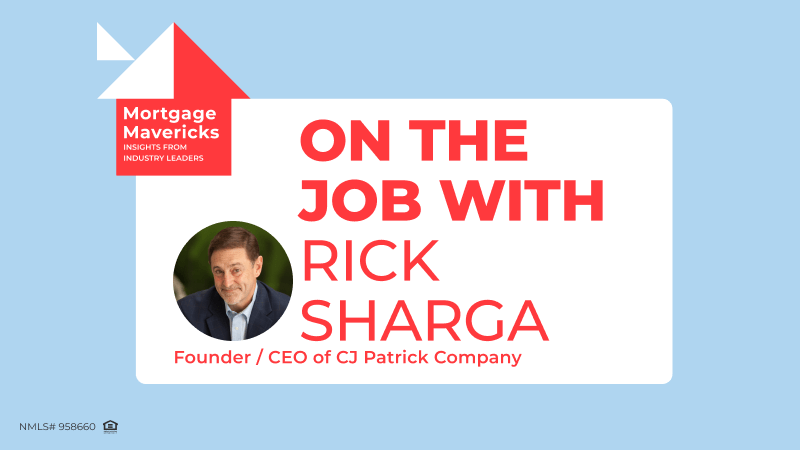
In this Mortgage Maverick series, we sit down with prominent individuals in the mortgage industry to glean invaluable insights and perspectives. From renowned lenders and brokers to influential regulators and industry experts, we dive deep into their experiences, strategies, and vision for the future. Join us as we uncover the secrets of success, explore emerging trends, and gain expert advice from these mortgage mavens. Our interview is with Rick Sharga, founder of CJ Patrick Company.
Struggling with a loan scenario?
Get a solution in 30 minutes!Fill out the short form and get a call from our AE
Submit a ScenarioRick Sharga is the innovative founder and CEO of CJ Patrick Company, a market intelligence and advisory firm at the intersection of real estate and mortgage. His impressive record of success in these industries spans over 20 years, and his considerable influence has earned him coverage in several prominent news outlets like CNBC, CBS News, NBC News, CNN and ABC News. He’s a founding board member of the Five Star National Mortgage Servicing Association; a board member of the Asian Real Estate Association of America and the National Association of Default Professionals; plus he’s been included twice on Inman News’ Inman 100, their annual listing of the top leaders in real estate. Thanks to his considerable experience as EVP/Market Intelligence at ATTOM Data, EVP for Carrington Mortgage Holdings, EVP of Marketing at RealtyTrac, Chief Marketing Officer for Ten-X and Auction.com, Rick is a respected authority on both real estate and mortgage trends.
Carl: Can you share with us your journey in the real estate and mortgage industries, and what inspired you to establish CJ Patrick Company as a market intelligence and advisory firm?
Rick: I’m an accidental tourist in the real estate and mortgage industries. I spent the first half of my career doing marketing for technology companies – large, international firms like Toshiba and Hitachi, mid-sized software companies, and start-ups. When the dot-com bubble burst, the company I was working for went out of business and I opened my first consulting practice, where RealtyTrac became a client. I wound up on board there full-time as the VP of Marketing as we launched the company as a national resource for investors and agents looking for foreclosure data. When the foreclosure crisis hit, we were the only company with a national report on foreclosure trends willing to speak with the media about what was going on, and I became the company spokesman.
Over the next 10 years, my role dealing with the media and as a speaker at industry events expanded beyond foreclosures into other mortgage-and-real estate-related issues. I’ve realized over the years that companies in our industries have a need for the kind of market intelligence that I’ve been delivering on behalf of various employers (RealtyTrac, Carrington Mortgage Holdings, Auction.com, and ATTOM Data), and decided to open my own practice to provide that kind of information to my clients. I’m currently working with five different companies and getting into a much wider range of data and industry topics than ever, so I’m certainly keeping busy.
Carl: As a renowned expert frequently quoted in major media outlets, could you highlight some of the most significant real estate, mortgage, and foreclosure trends you’ve observed in recent years?
Rick: As I mentioned above, I cut my teeth in the industry during the foreclosure crisis that was a big part of the Great Recession. The country had never experienced that kind of foreclosure wave – and hopefully never will again. That was pretty much my baptism by fire in the mortgage and real estate markets, learning more than I’d ever hoped to about mortgages, delinquencies, defaults, foreclosure processes, and distressed property sales. That crash resulted in wholesale changes, implemented by the newly-created CFPB, in how the mortgage industry qualified borrowers and underwrote loans, dramatically reducing risk and improving loan quality.
The other big event, of course, was the COVID-19 pandemic, and the unprecedented intervention by the Federal Government to prevent foreclosures with a moratorium and the implementation of a one-of-a-kind forbearance program. We also saw how the Federal Reserve could stimulate the housing market by suppressing interest rates, which led to historically low mortgage rates, and soaring home prices. Ironically, these home prices contributed to the highest level of inflation the country has experienced in decades, and which the Fed is now trying to get under control by raising interest rates.
Even more ironically, the Fed has caused mortgage rates to double in the past year, which in turn has led to “rate lock,” where homeowners are unwilling (or can’t afford) to list their homes for sale, so we now have historically low levels of inventory, causing prices to go up even further, creating affordability issues for many prospective buyers. On the other hand, the COVID pandemic did force the industry to do more and more remotely, and accelerated the development of technology that should make both the mortgage and homebuying processes much easier in the future.
Carl: With your extensive experience and roles in various companies, what pivotal moments have shaped your approach to market intelligence and advising businesses in the real estate and mortgage sectors?
Rick: I don’t know that I’ve had an epiphany about market intelligence, but I’ve had a gradual awakening over the years, and have come to realize that simply making data available isn’t enough. There’s a veritable universe of real estate and mortgage data floating around – much of it free or easily accessible – but companies don’t make optimal use of it. That works both on inbound and outbound data. By that I mean some companies have a massive amount of proprietary data; I help them leverage that data to create reports that are relevant to their customers and prospects or can be used to get them noticed by the media in their industries.
With other companies, I help them sift through data that they license, or that’s freely available to pull out information that’s relevant to their business and help communicate the findings throughout the organization – sometimes to all employees, sometimes to senior management of product management, and sometimes to the Board of Directors. For some companies, I do both. It’s interesting to meet with companies and figure out what their objectives are, or what pain points they’re experiencing, and then find and work with data in a way that addresses those things.
Carl: Being a founding member of the Five Star National Mortgage Servicing Association and serving on the boards of other prominent associations, how do these involvements contribute to the improvement of the real estate and mortgage industries?
Rick: That’s a great question, and I’m glad you asked it the way you did. I truly believe that participation in these industry organizations is an opportunity to drive change and growth within the industry, and to work together with business partners and competitors on important initiatives. For example the National Mortgage Servicing Association was able to put proposals in front of senior executives at the CFPB when that regulator was putting its foreclosure and loss mitigation rules in place. The Asian Real Estate Association of America has been able to have its voice heard on Capitol Hill as an advocate of both affordable housing, and sustainable homeownership for Asian Americans.
So, the impact in some cases goes to improvements and enhancements within the industry, but sometimes adds value to society as a whole. And participating in these groups also gives participants a real opportunity to stay connected, and know what’s happening across the market today as well as where things are headed in the future.>>
Carl: As the Chief Marketing Officer of Ten-X and Auction.com, you played a crucial role in the leading online real estate marketplace. What key insights have you gained from your experience in this rapidly evolving digital landscape?
Rick: I believed when I joined Auction.com that the future of real estate was going to be online. And I still believe that, but the adoption curve is taking longer than I’d anticipated. Most people today start their home search online, many find their real estate agent online, and a large and growing number apply for and secure their mortgage online. What’s still missing in the traditional retail market is the ability to execute the final sale online – although Auction.com, Ten-X and other companies continue to do complete transactions online for distressed residential and a variety of commercial real estate.
My experience at those companies tells me that the next generation of homebuyers wants to do as much as possible online, and the technology exists to enable the negotiations, contract signing, and disbursement of funds all online. Some mortgage company or real estate firm is going to be the first to cross that threshold, and I think will rocket past its competitors when it does so. There’s simply no reason for the mountains of paper, back-and-forth in-person meetings, and other antiquated rituals that we put homebuyers, home sellers, and borrowers through, and eventually technology will eliminate or at least dramatically streamline the whole process.
Carl: In your opinion, what are the most critical challenges and opportunities facing companies in the real estate and mortgage industries today, and how can businesses prepare for the future?
Rick: Without trying to be overly dramatic, I think for many real estate and mortgage companies in today’s market, the real challenge is simply survival. We’re looking at home sales at the lowest level since 2009, and mortgage loan production down about 80% from its peak just two years ago. Most industries don’t have those kinds of wild swings, and it’s hard to be successful when the market is at its nadir. Longer term, I think the challenge for real estate companies is going to be staying relevant in a market where consumers increasingly will take on more and more of the functions formerly done by real estate agents.
I think agents will always have a role – most people, even Millennials, still want to work with an agent – but the agent’s value proposition is going to have to evolve as the market changes. “I know which properties are for sale” was a good value proposition 20 years ago, but not such a big deal today. Similarly, real estate companies are going to be challenged to stay relevant to real estate agents – the market has shifted pretty dramatically from the days when buyers and sellers would look for an agent who represented a specific brand – like Century 21 or RE/MAX – now they tend to work with whoever the local market agent is, at least in part because the internet has made it much easier for those agents to build their own brands. So, again, what’s the value proposition for a real estate company going forward? What do they offer the agent that is enticing?
Mortgage companies have a huge problem in differentiating themselves from other lenders; most buyers are “shopping rates,” and aren’t as brand sensitive as they used to be. So how does a mortgage company set itself apart from its competitors? Technology? Employee diversity to create affinity with various populations of customers? New products aimed at workers in today’s economy (think: gig workers)? Process enhancements? And how do mortgage servicers create and maintain meaningful relationships with borrowers to keep them as customers when it’s time to refinance or buy a new home? There are a lot of opportunities in those challenges for companies with the vision and commitment to take advantage of them.
Carl: How do you envision the role of technology and data analytics in shaping the future of real estate and mortgage markets?
Rick: I believe that we’re barely scratching the surface when it comes to data analytics in the real estate and mortgage industries. Think about it: almost every report you read is looking backward at what’s already happened. How can companies leverage all the data that’s out there to use in real-time, or even better, to look ahead? How can data anticipate customer needs and wants? And the best way to communicate with the customers is best suited for whatever it is your company is offering. We’re starting to see companies play with AI a little bit; use machine learning to handle rote tasks or do some predictive modeling; and use computer vision to streamline what used to be tedious, manual processes.
We’re finally seeing states adopt processes like online notary services and move towards blockchain technology in some cases. But the use cases so far are generating incremental improvements at best. Someone’s going to figure out how to make all these different pieces of data work together to create an entirely new customer experience and turn the market upside down. Imagine opening an app and being shown only homes that are exactly the ones you’re interested in and can afford, and then being able to secure financing, take a visual tour, shop for your own title insurance, and click “buy house” while you’re waiting in line at Starbucks for your caramel latte.
This isn’t about disintermediation, by the way; this is about modernizing a process that hasn’t materially changed since the invention of the quill pen. Long, long overdue. But it feels like we’re right at the cusp of massive change.>>
Carl: As an expert advisor, what advice would you give to individuals looking to thrive in the real estate and mortgage industries amidst changing market dynamics?
Rick: Never lose sight of your customers, and what they need or want. You’re in the business – in one way or another – of providing housing for individuals and families. There’s a lot that goes with that: security, stability, potentially intergenerational wealth – so whether you’re listing a home or underwriting a loan, your customer isn’t thinking much about your product or your job, they’re looking at fulfilling a dream. However, the industries change, that single fact won’t. And it’s your job to use everything at your disposal to help that customer achieve it.
Carl: Can you share a particularly memorable success story or pivotal moment from your career that has had a lasting impact on your perspective and approach to the industry?
Rick: I remember taking a call at 7:30 one evening from the senior aide to a Senator from New York State who was working on a foreclosure bill that was being presented to the committee the next day. She had questions about the foreclosure process and had seen my name in the press so thought I might be able to help her. I spent almost two hours on the phone with her, going through the bill in detail and changing an awful lot of it, because whoever had drafted it really had no idea how foreclosures were done. As we wrapped up the call, I realized that what I did – and wrote and said – had the ability to influence people, and even public policy and that I needed to make sure I always acted responsibly. I’ve tried to always live up to that responsibility throughout my career.
As a mortgage broker, your clients rely on your expertise to find them the best deals. Our Quick Pricer tool can be an invaluable asset in your quest to secure the most advantageous mortgage rates. Be sure to explore our Programs section for additional resources tailored to your needs. If you have specific scenarios in mind, don’t hesitate to request them; we’re here to assist you. And if you’re interested in joining forces to provide even more value to your clients, consider becoming a partner with us. Together, we can empower individuals and families to achieve their dreams of homeownership.
Upcoming Webinars

September 27 @ 1:00 pm EST
Expert Insights: Navigating Fall Housing Market Trends for Mortgage Brokers with Rick Sharga
OnlineDelve into the intricacies of the fall housing market and gain actionable insights that will empower you to guide your clients effectively. As the leaves change, so do the dynamics of the real estate market. In this webinar, esteemed real estate authority Rick Sharga will dissect the latest trends, providing you with the tools to navigate lending strategies in the evolving landscape. Whether you're a seasoned professional or just starting out, this webinar is your key to staying ahead in the autumn market. Mark your calendar and secure your spot to gain invaluable knowledge from a true expert.
Register

